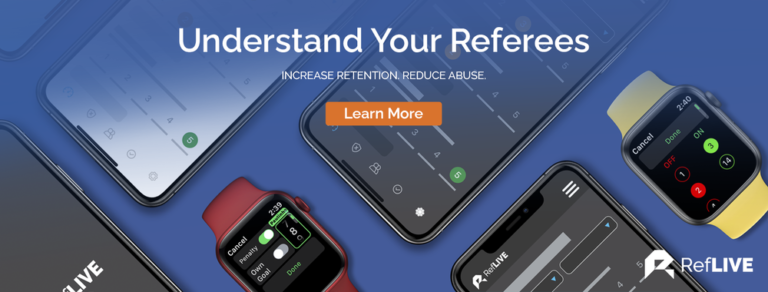Many of the previous editions of The Third Team Blog have revolved around lockdown, coronavirus and the implications that this has had on referees. However, as we now have a map out of this pandemic, I’d like to place the focus of this blog onto an altogether different ‘C’ word, Control.
Concern Without Control
In previous blogs, I have shone a light on how the events of the last 12 months have resulted in thoughts which are difficult to process, such as:
- When will things be back to normal?
- Will my family and I be safe?
Referees also found themselves processing these thoughts and may also face further performance-related questions:
- When will I be able to officiate again?
- Will I preform as well as before the break in fixtures?
Any of these thoughts, if not addressed adequately, can cause anxiety in an individual. Do you notice anything about the questions?
These concerns are around issues that cannot be controlled by you.
They can’t be simply wished away or prevented from occurring in the first place. Unfortunately, there are some aspects of your personal and officiating life that you simply can’t control, but this doesn’t stop these kinds of concerns from occurring and disrupting our mindset.
Besides Coronavirus, worrying about your personal performance, your colleagues in your team’s performance or other official’s performances are just a few concerns a referee will more than likely face over the course of the season, with some more controllable than others. For example, you can’t control how players react to your decisions, or the heavy rain that can make the game much more difficult to manage, and you definitely can’t control which team has the most possession or the scoreline! Feelings all too familiar to an official, right?
However, there are concerns that you CAN control. By doing so, a positive mindset can be maintained, helping prevent negative, even defeatist thoughts, which promote anxiety.
Control the ‘Controllables’
I have touched on this concept before, when talking about the benefits of routine. By aiming to control what you can, a sense of empowerment can be created. In short, when focussing on the controllables, anxiety is minimised and confidence is improved due to you feeling more in control of the factors in your life, such as your preparation and not outside events.
Now let’s not focus on training with your colleagues as it’s not allowed for a few more weeks (another uncontrollable) but rather focus on you and your personal officiating brand.
To start, make a list of the thing that you feel that you can control in wider life. This could be anything that you can influence!
Such as:
- Living a balanced, healthy lifestyle (eating healthy, staying active)
- Punctual time management
- Setting goals and sticking to them
Everyone’s lists will be different, some may find it hard to make a list. But this isn’t as negative as you would think.
Secondly, you may wish to write a list of the things you feel in control of in your game, both on and off the field. For example, I feel that my list includes: –
- My patrol paths
- How I train to be match fit
- Who I train with and how long for
- My pre-match routine
This list has endless possibilities. If your list is short then don’t worry, this doesn’t mean that you aren’t in control or a bad referee!
Practice Makes Perfect (Control)
By starting with the performance-related controllables that you already are in control of, you are identifying those that will be easy to master complete control over. A further benefit of starting with a list of the variables that you can control should provide the perfect spring board to progress.
To go further, you can focus on those concerns that you want to control but haven’t quite achieved yet, as long as they are in your ability to do so. You may feel that you can control your patrol path, but you haven’t got complete control of due to a tendency to over/underrun into the areas you’re occupying on the pitch. For an assistant referee, it could be that you’re having difficulty in transitioning from monitoring the touchline to detecting offsides when the ball is played forward and into the centre of the field of play.
The common denominator in improving this control is practice.
To ensure that I mastered covering the correct paths to patrol, it would involve me practising by doing a pitch based HI session. It could involve rehearsing different directions of moment about the pitch or different types of runs to those I’d typically make. Should it be for how you train on the pitch or in the gym, it could involve you writing down drills, or techniques you want to add to your repertoire to be able to execute in a future match.
Naturally, you should do what you feel will help develop that level of control. Your colleagues can help you identify your strengths, and your coach might be able to help you with ideas or even integrate ideas into sessions. After all, what helps you may help in other aspects of your life! It can be easy to focus upon weaknesses in one another as well as ourselves, but identifying strengths is just as, if not more, important than weaknesses. In saying so, neglecting weaknesses shouldn’t happen. Just keep in mind that a little bit of self-love and appreciation can go a long way to improving your confidence, performance and enjoyment of officiating.
At The Third Team I work individually and in collaboration with different professionals where I have developed workshops associated with Resilience and Mental Toughness Development to help referees. The workshops are interactive, where referees are encouraged to open up and share their experiences to help each other.
Feel free to contact me if you’d like to know more about my workshops and how I could help you or your officials.
Best Wishes,

Nathan Sherratt
Referee Educator & Managing Director of The Third Team

Nathan Sherratt
Nathan Sherratt, Referee Educator, Resilience Trainer and Managing Director of The Third Team. A Mental Toughness Practitioner based in County Durham, North East England.


